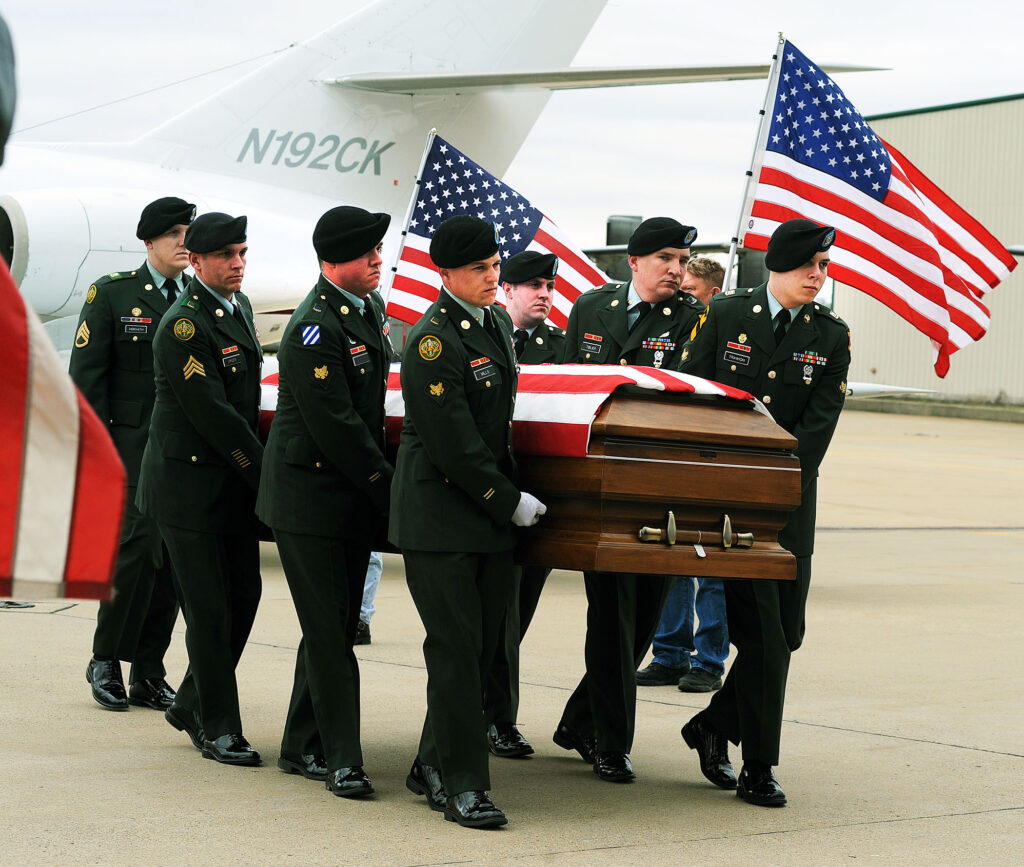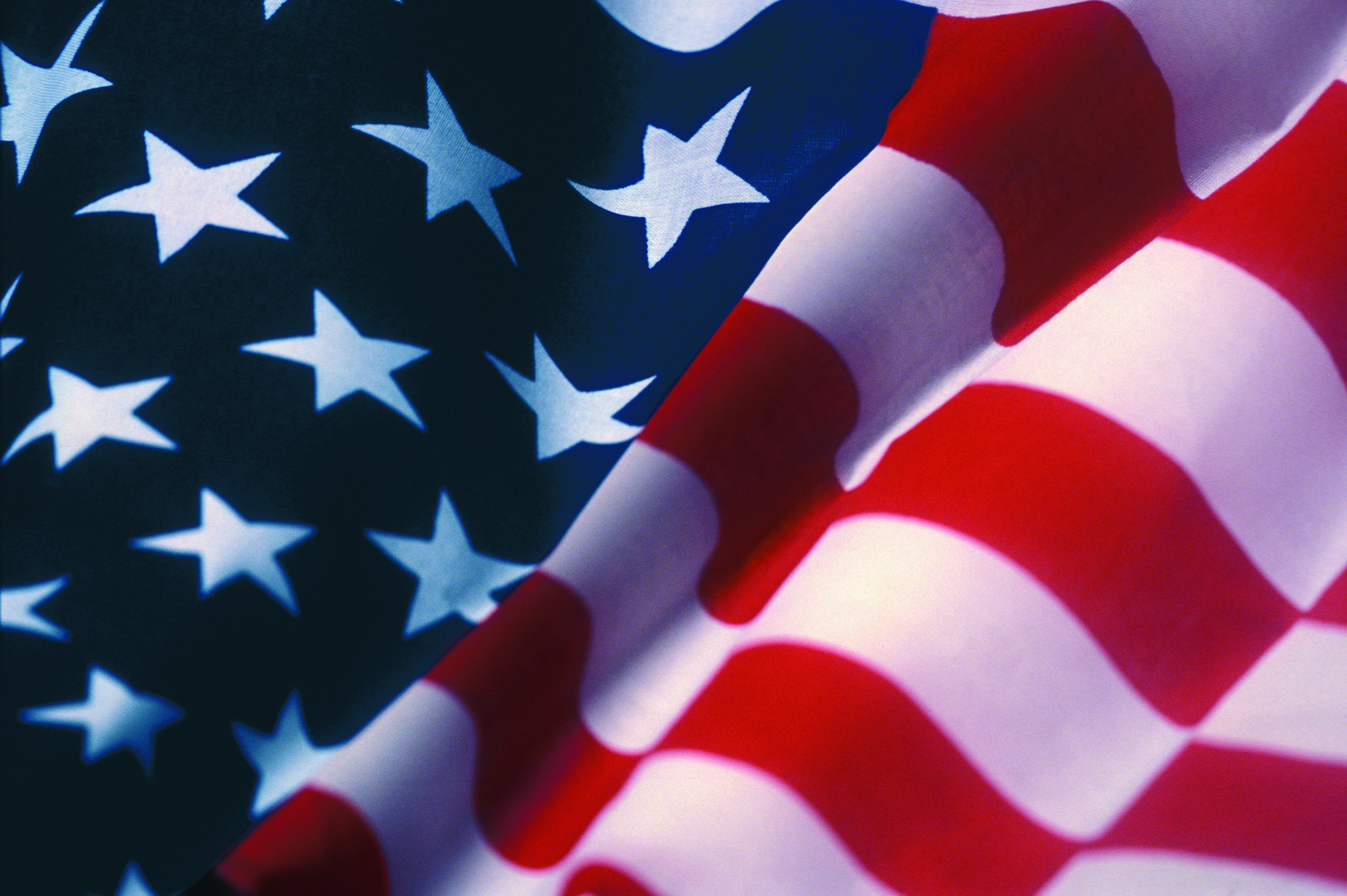After sidling by the hills and poking through the fog, there it is.
On the days when the sky is a lithograph blue, Berry Birurakis really doesn’t have to look for it all.
Then, it just proclaims: The smoothest ribbon of transit there ever was, etched in a line so straight and precise, it could put a carpenter’s level to shame — no matter what the surrounding landscape says.
Every time, there’s the hearse and the honor guard.
And the brave-sad huddle of a family now playing out its destiny, against its will.
It’s happened to other families over the course of the fighting, but that was always somebody else. Now, it’s happening to them.
Another widow, another kid with his dad’s dog tags and maybe an encouraging message scrawled on a Post-It before he deployed.
Another set of parents forced to bury their child — and no set of parents should ever be forced to do that.
Another Gold Star in the window, at least metaphorically.
“OK,” Birurakis would always whisper to himself, as he eased the vintage Falcon 20 jet onto the tarmac, feather-light.
“Let’s bring it in smooth. Let’s bring our hero home.”

Disrespect — captured
Today is Veterans Day, and on this day, Birurakis’ thoughts will be in the clouds, as they always are on Nov. 11.
He’ll think back to those missions he and his fellow pilots flew during the mid-2000s, when the combat in Iraq and Afghanistan was at its most intense.
That’s what they were: Missions, of compassion and empathy.
The military calls it, the “dignified transfer” — an apt description, if there ever was.
For civilians, we don’t see the all of it, when a causality of war comes back home.
There’s the initial ceremony, where the flag-draped coffin is trundled off the military flight at Dover Air Force Base in Delaware.
Finally and truly getting the soldier home, however, entails another flight.
And that involves Birurakis, and the other pilots of Kalitta Charters, a transit company based in Ypsilanti, Mich., contracted by the Department of Defense in 2006 for the missions.
The first such flights were made on the first day of the year in 2007.
Before, the fallen of the War of Terror made the journey to Dover in the cargo holds of commercial flights.
Poignant and ironic, that was, since it was what happened to a quartet of ill-fated commercial flights on Sept. 11, 2001, that led to the U.S. response in the first place.
Birurakis remembers wincing at the image captured by a newspaper photographer in Denver in the days before the private charters.
Most compelling was the photographer’s framing of the civilian passengers on one such flight.
Each had their own response, at their own window seat, as they regarded the U.S. Marine escort just below, tending to the casket containing the remains of a brother who had to come home that way.
Another image, this one throttling up a brief surge of anger, was in real-time. He was there.
It was of two coffins, each with the remains of a fallen soldier, and each encased in the travel box to ensure no jostling, no dings, no anything. The pilot spied them one day.
What troubled Birurakis, he said, was that they were simply stacked on the floor in a cargo hanger — just like any other shipment.
“I was worried they were going to use a forklift or something to just ‘load’ them on the plane,” he remembered.
“I knew what was in those boxes and I saw two other guys who knew it, too.”
Amazed, he watched as the pair, talking casually, did cellphone snaps, while appearing to send the photos, as well.
“The names of the soldiers were stenciled on the boxes,” Birurakis said.
“I thought, my God, what if they post them somewhere and the family sees them? It just wasn’t respectful. Any of it.”
Closest to home — and a pilot’s resume
The objective, Birurakis said, was to simply bring the fallen home — no matter how remote that location may be, across the width and breadth of the U.S.
Big towns, little towns and no-towns.
The closest airport to the family home, the funeral home or the church, even if said airport is two or three or four counties over.
“We’re going to get as [geographically] close to that soldier’s family and home as we possibly can,” he said.
It didn’t need a fancy tower. A runway, just long enough, would suffice.
“A lot of times we’ll fly into Morgantown or Clarksburg-type airports,” he said. “And ones smaller than that.”
The pilot isn’t being disparaging.
Morgantown’s airport, Hart Field, was where he learned to fly. He was working there in 1974, fueling aircraft and doing other menial jobs. He was around 20 and the Vietnam War was drawing down.
He had been an ROTC student at WVU and thought he might make the military a career, including a tour in the war zone.
The draft went away, and so did his focus, for a while.
On impulse he made a run to Pittsburgh with a local pilot, who briefly let him take over.
“You wanna fly ‘er?”
“Yeah, let’s try it.”
It wasn’t too long later when he soloed and got a job with Kalitta, the company he still works for. Birurakis these days is a general manager at the headquarters in Michigan, but the boss and grandfather who turns 68 this month still takes to the air when he isn’t flying his desk.
Early in his career, he flew turbo-prop charters to Indianapolis nightly, before graduating to the sleek Learjets he steered to Europe and Japan on a regular basis.
On Sept. 11, 2001, he was in Dallas, getting certified on a British-built jet that was a newly made purchase for the company, when everyone started running toward the television sets.
Respect, in the flight plan
Birurakis, whose last name sounds like, “Bear-AAH-kiss,” is a second-generation Greek-American.
His father, Louis, who is 95 and still goes to WVU football games, is fluent in the language that made the passage with his parents.
Up until his senior year at University High, the elder Birurakis was “Lou Berry.” That went back to elementary school, when his first-grade teacher had decreed his birth name on her roll sheet would be too hard to spell or pronounce.
When he was drafted in 1945, while war was still being waged on two battlefronts just as fierce, he proudly mustered in under his real name.
“Berry,” he bestowed unto his son, just because.
It’s about respect and tradition, Berry Birurakis said, and the names of those soldiers whose wars ended that he was helping carry home.
It’s about gassing up the Falcon 20 and going off in search of another little runway somewhere in America.
“When you’re bringing a fallen soldier home, it really affects you, socially and psychologically,” he said.
“We might have a family member in the plane to help escort their loved one. These are the toughest flights I’ve ever made, but they’re also the most rewarding, because we’re there for the soldier and that family member.”
The ceremony that follows at that nondescript airport is a repeat of the one at Dover. It’s aching to watch, Birurakis said, but it has to be.
He just hopes he doesn’t have to fly any more such missions.
The pilot, as said, thinks about families and flag-draped coffins on Veterans Day.
It’s hard not to think about them, anyway.
He thinks about wheels up, wheels down and of being an Everyman Pilot, charting a course and carrying out his duty and obligation.
The husbands and sons and wives and daughters of the all-of-a-sudden Gold Star families may have worn the uniform for varying reasons, he said, but they all wore it.
And for him, that has to count.
It just does.
“They gave all,” he said.
“And what we can do, is bring them home. With respect and dignity.”
TWEET @DominionPostWV




